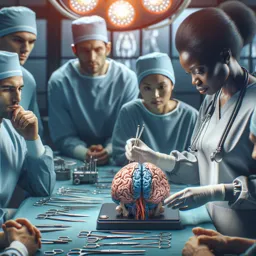Introduction
Neurosurgery is one of the most complex and specialized areas of medicine, dedicated to diagnosing, treating, and rehabilitating disorders of the nervous system. From the brain and spinal cord to peripheral nerves and blood vessels, neurosurgeons combine advanced surgical expertise with compassionate patient care to manage life-altering conditions.
What Is Neurosurgery?
Neurosurgery focuses on the treatment of conditions affecting the nervous system, including the brain, spinal cord, peripheral nerves, and related structures. It encompasses both surgical and non-surgical approaches, making it a vital discipline within modern healthcare.
Scope of Neurosurgery
Neurosurgeons are trained to manage a wide range of conditions, including:
- Traumatic brain injuries and spinal cord accidents
- Congenital anomalies such as spina bifida
- Brain tumors
- Stroke and vascular disorders
- Chronic pain and functional disorders
Their expertise extends across multiple domains, requiring both technical precision and interdisciplinary collaboration.
Common Neurosurgical Procedures
Some of the most common procedures performed by neurosurgeons include:
- Craniotomy: Temporary removal of part of the skull to access the brain, often for tumor removal or clot evacuation.
- Spinal Surgery: Procedures to relieve spinal cord compression, repair herniated discs, or correct congenital defects.
- Deep Brain Stimulation (DBS): Minimally invasive implantation of electrodes to treat conditions like Parkinson’s disease.
- Peripheral Nerve Surgery: Treatment of nerve injuries and disorders, such as carpal tunnel syndrome.
Training and Skills in Neurosurgery
Becoming a neurosurgeon requires many years of rigorous education and training. Following medical school, physicians complete residency programs in neurosurgery that last several years, often followed by fellowships for subspecialization in areas such as pediatrics, oncology, or vascular surgery.
Neurosurgery and Patient Care
Neurosurgery goes far beyond the operating room. Surgeons collaborate with neurologists, radiologists, anesthesiologists, and rehabilitation specialists to deliver holistic care. Post-operative rehabilitation and long-term follow-up are critical to ensuring the best recovery outcomes.
Innovations in Neurosurgery
Recent advancements are transforming neurosurgical practice. Techniques such as minimally invasive surgery, neuronavigation, intraoperative MRI, and robotics allow for greater precision, shorter recovery times, and reduced complications, making care safer and more effective.
Conclusion
Neurosurgery is a demanding yet profoundly rewarding field that addresses some of the most challenging conditions in medicine. By combining surgical expertise, innovative technology, and patient-centered care, neurosurgeons play a crucial role in improving quality of life for patients worldwide.



















